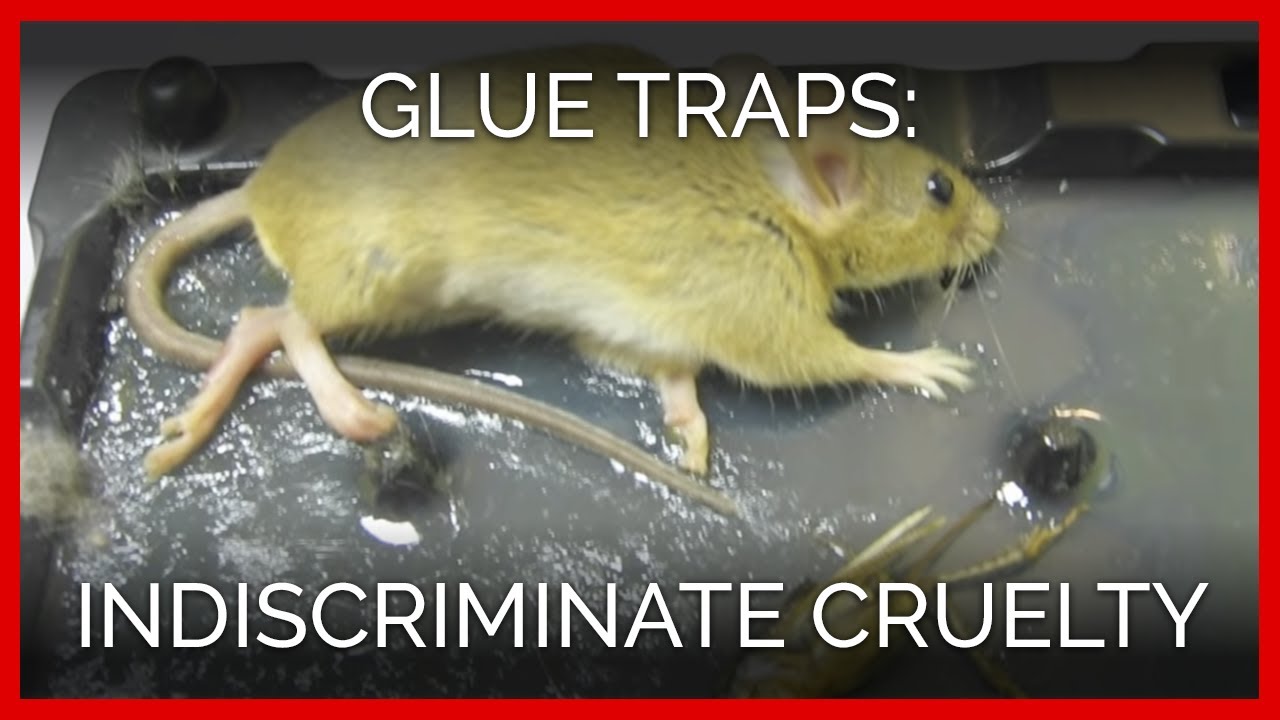Superior Natural Pest Repellent.
Safe for Everyone.
Are glue traps humane? The simple answer is no.
Glue traps cause a lot of pain and suffering to the animals they capture.

These traps, also called glue boards, are popular in pest control because they are inexpensive and easy to use.
The glue board is coated with a highly sticky adhesive that can trap not just rodents but also insects, birds, snails, squirrels, and snakes.

Glue Traps are Inhumane, Indiscriminate, Ineffective, and Dangerous
Glue boards are a terrible way to control pests because they are inhumane, indiscriminate, ineffective, and dangerous. Here are four reasons why:
1. Glue Traps is Inhumane – Cause Prolonged Suffering
From a humane perspective, glue traps are widely viewed as cruel.
When an animal gets caught in a glue trap, it tries hard to escape but gets stuck even more. This causes the animal to experience a lot of stress and can lead to serious injuries, such as torn fur, broken limbs, or damaged skin.
In many cases, the captured animals can be alive for hours or even days, leading to extreme stress and a slow, painful death.
These animals often die from starvation, suffocation, or dehydration.
Many animal welfare groups, like Humane Society International, say glue traps are among the cruelest ways to control pests.
2. Glue Traps Is Indiscriminate – Target Pests and Non-Target Animals
Glue traps are mainly used to catch rodents like mice and rats, but they also catch many other animals.
Worse, glue traps often trap animals that aren’t the target, like wild birds and even household pets. They often fall victim to these traps.
Wildlife experts said glue traps can also harm endangered and protected species.
For example, hedgehogs and fox cubs have been known to get stuck in these traps.
This unintended harm to wildlife can have broader ecological consequences.
3. Glue Traps Are Ineffective
Glue traps are ineffective because they don’t address the source of the rodent problems: If you block or plug the holes and remove what attracts them, more rodents will come.
While some rodents are caught, others breed faster, leading to more rodents.
Also, glue traps become useless after two weeks because the sticky part stops working.
4. Glue Traps Are Dangerous Health Hazard
Glue traps can also be a public health hazard.
When animals get stuck in these traps, they often stay alive for a while and keep urinating and defecating.
The Centers for Disease Control and Prevention (CDC) says pathogens such as hantavirus and salmonella are common in the urine and feces of trapped animals.
You and your family can get sick from these diseases if you touch glue traps without proper protection.
Even throwing away these traps can be risky if you don’t do it correctly.

Glue Traps May not be Legal
The legal status of glue traps varies by country.
Some places have banned or regulated them because they are seen as cruel.

For example, New Zealand and Australia have strict rules about using glue traps, and Ireland and Iceland also regulate or ban them.
Some states, like New York, have restrictions in the United States, but there is no federal ban yet.
In England, people have debated the ethical issues and called for a total ban.
The legal landscape reflects a growing awareness of the ethical problems with using glue boards.
Found an Animal Stuck on a Glue Trap?
If a bird, pet, or any other animal gets stuck on a glue trap, act quickly. Carefully use vegetable oil to free the animal. If it is injured or needs more help, contact a wildlife expert.
- Put on thick gloves to protect yourself.
- Warm some vegetable oil (not too hot).
- Gently hold the animal with a towel.
- Slowly massage the warm oil into the glue until the animal is free.
- Keep the animal in a warm, quiet place until help arrives.
Always seek professional help if you’re unsure or if the animal is injured.
Alternatives to Glue Traps
There are several humane alternatives to glue traps that can minimize animal suffering while effectively controlling rodent populations.
Natural rodent repellents are made from ingredients like essential oils, such as peppermint or citronella oil, that rodents find unpleasant. You can scatter these pellets around areas where you have seen rodent activity. The strong smell of these natural ingredients drives rodents away without harming them. Here are some key benefits:
- Safe for Non-Target Animals: Unlike glue traps, natural repellent pellets do not harm birds, pets, or other wildlife.
- Eco-Friendly: These repellents use natural ingredients, making them an environmentally friendly choice.
- Effective Deterrence: Rodents dislike the smell and taste of these pellets, which encourages them to leave the area.
Other Prevention Methods
In addition to using natural repellent pellets, there are several preventive measures you can take to keep rodents away:
- Seal Entry Points: Close off any holes or gaps in your home where rodents might enter.
- Maintain Cleanliness: Keep your home clean and free of food scraps that might attract rodents.
- Proper Food Storage: Store food in airtight containers to prevent attracting rodents.
Takeaway
- Glue traps cause animals a lot of pain and suffering.
- They often catch animals that aren’t pests, like birds and pets.
- Glue traps don’t fix the problem because rodents keep coming back.
- They can be dangerous to your health because trapped animals spread diseases.
- Some places have banned or restricted glue traps because they are seen as cruel.
Recommendations:
- Use natural rodent repellents with essential oils to keep rodents away without hurting them.
- Seal any holes or gaps in your home to prevent rodents from entering.
- Keep your home clean and store food properly to avoid attracting rodents.
You can manage rodent problems by choosing humane methods while being kind to animals and protecting your health.




